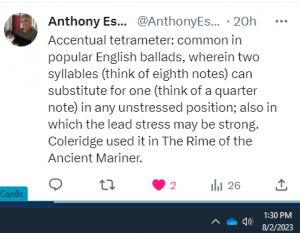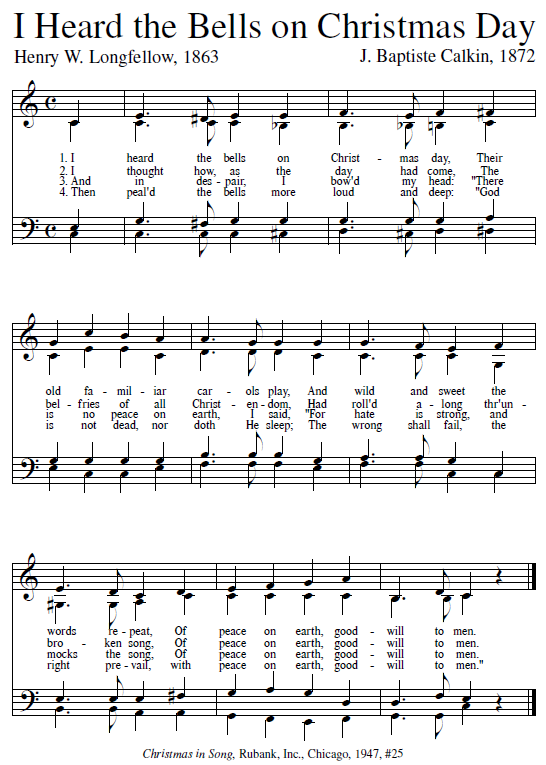“I was looking at one of those American classics that most of us studied in high school, “The Midnight Ride of Paul Revere.” How wonderful this is–a meter that captures a horse’s gallop. Longfellow was a good writer, telling a great story in a magical way, and he pulled this off. I bet most people assume it’s a standard poetic form of some kind. However, when I looked at it closely and counted syllables, I realized Longfellow mixed up his lines and endlessly created variations on his metrical scheme. A lesser talent, following the same rules more tightly, might make us bonkers by the 20th line. Longfellow managed to achieve a kind of beautiful roughness that is a metaphor for this country.” – Bruce Deitrick Price, The ‘Rules’ of Poetry—Says Who?
Another Longfellow poem with rhythmic asymmetry (departure from standard, rhythmic regularity) is the Three Kings, rendered here in an experimental format “artificially regular”.

Click the ▶ Button to Hear the Song, or Play the Song in a New Window ⧉
| Henry Wadsworth Longfellow | Sir John Stainer |
|---|---|
| 1) Three Kings came riding from far away, Melchior and Gaspar and Baltasar; Three Wise Men out of the East were they, And they travelled by night and they slept by day, For their guide was a beautiful, wonderful star. |
2) The star was so beautiful, large and clear, That all the other stars of the sky Became a white mist in the atmosphere, And by this they knew that the coming was near Of the Prince foretold in the prophecy. |
| 3) Three caskets they bore on their saddle-bows, Three caskets of gold with golden keys; Their robes were of crimson silk with rows Of bells, pomegranates and furbelows, Their turbans like blossoming almond-trees. |
4) And so the Three Kings rode into the West, Through the dusk of the night, over hill & dell, & sometimes they nodded with beard on breast, And sometimes talked, as they paused to rest, With the people they met at some wayside well. |
| 5) “Of the child that is born,” said Baltasar, “Good people, I pray you, tell us the news; For we in the East have seen his star, And have ridden fast, and have ridden far, To find and worship the King of the Jews.” |
6) And the people answered, “You ask in vain; We know of no King but Herod the Great!” They thought the Wise Men were men insane, As they spurred their horses across the plain, Like riders in haste, who cannot wait. |
| 7) And when they came to Jerusalem, Herod the Great, who had heard this thing, Sent for the Wise Men and questioned them; And said, “Go down unto Bethlehem, And bring me tidings of this new king.” |
8) So they rode away; and the star stood still, The only one in the grey of morn; Yes, it stopped—it stood still of its own free will, Right over Bethlehem on the hill, The city of David, where Christ was born. |
| 9) And the Three Kings rode through the gate and the guard, Through the silent street, till their horses turned And neighed as they entered the great inn-yard; But the windows were closed, and the doors were barred, And only a light in the stable burned. |
10) And cradled there in the scented hay, In the air made sweet by the breath of kine, The little child in the manger lay, The child, that would be king one day Of a kingdom not human, but divine. |
| 11) His mother Mary of Nazareth Sat watching beside his place of rest, Watching the even flow of his breath, For the joy of life and the terror of death Were mingled together in her breast. |
12) They laid their offerings at his feet: The gold was their tribute to a King, The frankincense, with its odor sweet, Was for the Priest, the Paraclete, The myrrh for the body’s burying. |
| 13) And the mother wondered and bowed her head, And sat as still as a statue of stone, Her heart was troubled yet comforted, Remembering what the Angel had said Of an endless reign and of David’s throne. |
14) Then the Kings rode out of the city gate, With a clatter of hoofs in proud array; But they went not back to Herod the Great, For they knew his malice and feared his hate, And returned to their homes by another way. |
|
I
|
09-10-09-11-12 |
VIII
|
10-09-11-09-10 | |
|
II
|
10-09-10-11-10 |
IX
|
11-10-10-11-10 | |
|
III
|
10-09-09-11-10 |
X
|
09-10-09-08-10 | |
|
IV
|
10-11-10-09-11 |
XI
|
09-09-09-11-09 | |
|
V
|
10-10-09-10-10 |
XII
|
09-09-09-08-09 | |
|
VI
|
10-10-09-10-09 |
XIII
|
10-10-09-10-10 | |
|
VII
|
09-09-09-09-09 |
XIV
|
10-10-10-10-11 |
An analogy for the structural principle underlying this performance, may be taken from aerodynamics: Early in the development of stealth aircraft, which used extreme aerodynamic design to present the aircraft with a low radar detection profile, the relatively “undetectable” aircraft suffered from the aerodynamic defect of actually being “a flying stone” ordinarily incapable of sustaining flight. The solution was to use computer fly-by-wire guidance to cause multiple inflight changes of airfoil orientation per second to keep the aircraft flying. In analogy with this rhythmic interpretation of Longfellow’s metric asymmetry, an artificially “symmetric” interpretation of the text is equally permissible as any other ordinary asymmetric interpretation, such as an actually arrythmic enunciation billing itself as “The Three Kings by Henry Wadsworth Longfellow — the classic Christmas poem“—If the poem can be presented without rhythm, it can be forced into taking on a “rhythmic” sense.
| Henry W. Longfellow, 1863 | J. Baptiste Calkin, 1872 Waltham |
|---|---|
| 1. I heard the bells on Christmas Day Their old, familiar carols play, And wild and sweet The words repeat Of peace on earth, good-will to men! |
2. And thought how, as the day had come, The belfries of all Christendom Had rolled along The unbroken song Of peace on earth, good-will to men! |
| 3. Till ringing, singing on its way, The world revolved from night to day, A voice, a chime, A chant sublime Of peace on earth, good-will to men! |
4. Then from each black, accursed mouth The cannon thundered in the South, And with the sound The carols drowned Of peace on earth, good-will to men! |
| 5. It was as if an earthquake rent The hearth-stones of a continent, And made forlorn The households born Of peace on earth, good-will to men! |
6. And in despair I bowed my head; “There is no peace on earth,” I said; For hate is strong, And mocks the song Of peace on earth, good-will to men!” |
| 7. Then pealed the bells more loud and deep: “God is not dead, nor doth He sleep; The Wrong shall fail, The Right prevail, With peace on earth, good-will to men.” |

